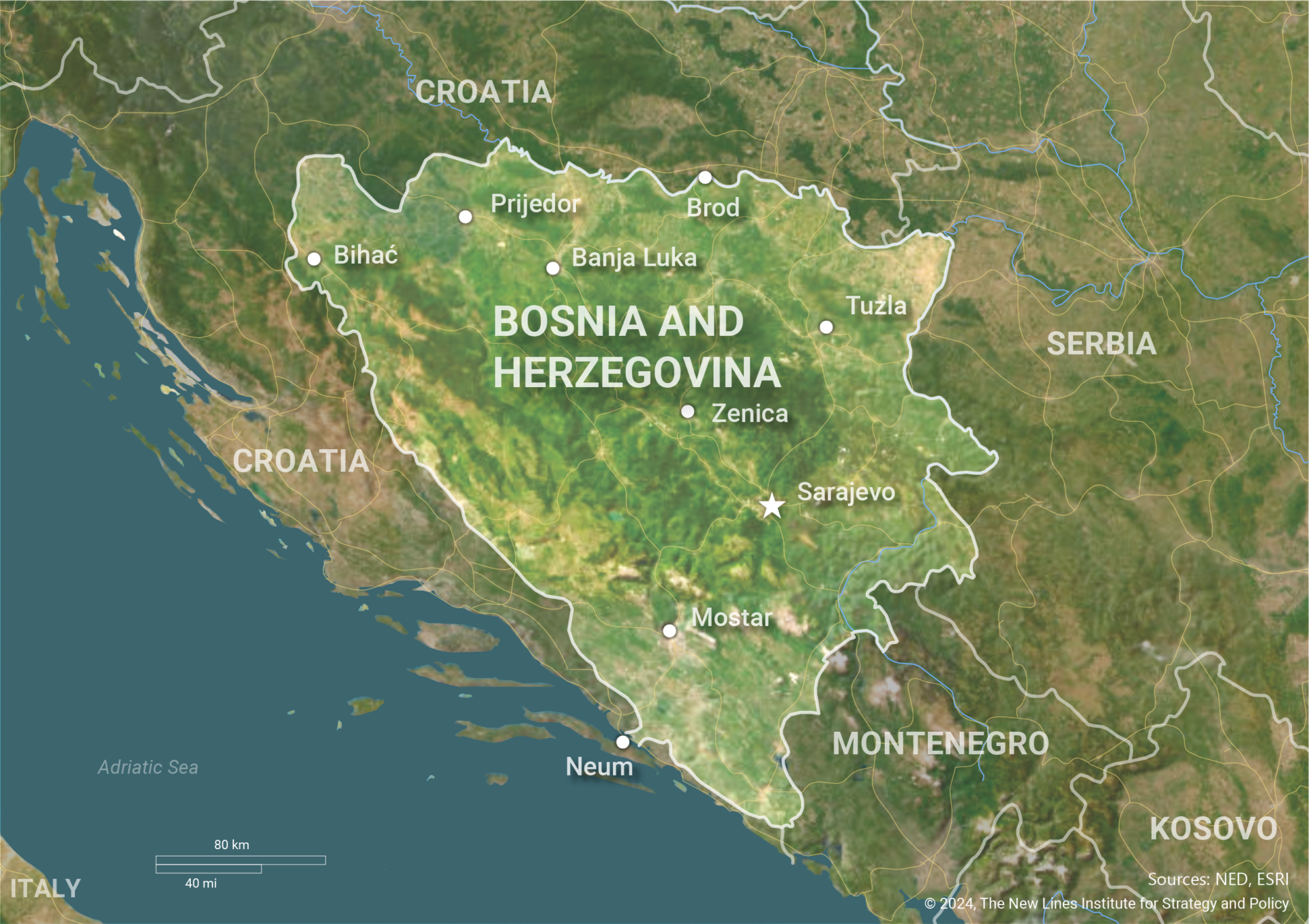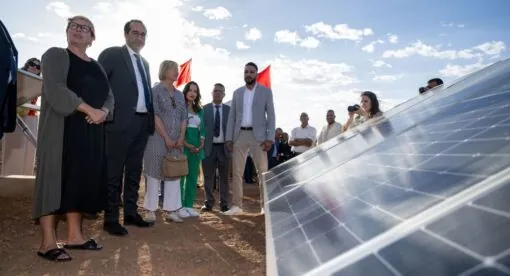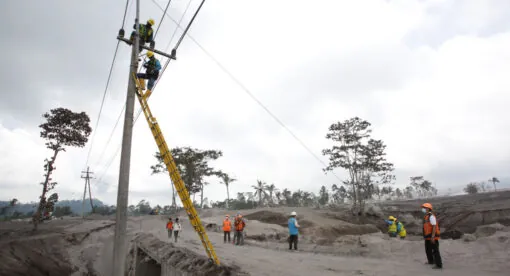Introduction
A four-day tour in November 2023 to the Western Balkans by NATO Secretary General Jens Stoltenberg started in Bosnia and Herzegovina (BiH). The visit was marked by clear messages of support for the territorial integrity and sovereignty of the Bosnian state and concern over rising Russian influence in the country. Stoltenberg’s statements are a result of a continuous effort by NATO to curb foreign malign influence after its recognition of BiH as a possible frontier for Russian activities following the invasion of Ukraine.
Besides statements, the visit reaffirmed NATO’s commitment to the newly established Defence and Related Security Capacity Building Initiative (DCB) package, which together with the renewal of the European Union Force in Bosnia and Herzegovina (EUFOR) mandate by the U.N. Security Council, should serve ready to guarantee stability in BiH. However, this stability has been continuously threatened by rising divisive rhetoric supplemented by secessionist politics of the leadership of the Moscow–backed Republika Srpska (RS), one of the two entities established under the Dayton Agreement. These activities, best illustrated by the constant political calls for the dissolution of the Bosnian state, threaten to undermine stability and weaken reforms, which will lead to a new crisis for NATO in Europe. They also represent a challenge for EUFOR in responding to any possible conflict. Threats to peace and security in BiH underline the importance of Euro-Atlantic integration and require clear, cohesive cooperation between NATO and EUFOR in the country.
This scenario raises questions over the status of BiH’s accession to NATO, BiH’s security situation in light of Russian actions in the Western Balkans, and EUFOR’s mandate and limitations in providing a safe and secure environment. In responding to these questions, NATO can take several measures to assist BiH to enhance its own security and defense posture in the Western Balkans. These include a forward-thinking quadrilateral “New Security” pact for BiH, a strategic framework of investment opportunities that would bolster the defense industry in the country, and a strict follow-up on the existing DCB package.
Bosnia and Herzegovina’s NATO Status
NATO sees the Western Balkans, and BiH at the center of it, as strategically important to a free and peaceful Europe. Likewise, BiH has recognized Euro-Atlantic integration as a strategic objective and has a long-standing relationship with NATO. The country joined the Partnership for Peace program in 2006 and was invited to join the Membership Action Plan in 2010. As part of NATO’s response to countries at risk following the invasion of Ukraine, the alliance in 2023 created and adopted a DCB package aimed at further building BiH’s capacities and enhancing its resilience in the face of foreign malign influence. The package, valued at between $48 million and $53 million, focuses on strengthening the country’s defense with nine projects and its security apparatus with three projects in cyber defense, crisis management, and counterterrorism. In the next five years, the package implementation will contribute to the strengthening of NATO standards and practices in BiH while further ensuring military interoperability between the Armed Forces of Bosnia and Herzegovina (AFBiH) and NATO forces in joint exercises, peacekeeping missions, or any other needs.
BiH, in its relations with NATO, is both a security consumer and a security provider, for the region and the alliance alike. In 2022, the AFBiH underwent NATO Operational Capabilities Concept Evaluation and Feedback, certifying the approximately 1,100-member Light Infantry Battalion group to NATO combat readiness standards. This allows the AFBiH to directly contribute to NATO’s deterrence posture across the continent. Furthermore, through regular Partnership for Peace activities, BiH has declared several assets and forces available to the alliance, especially in the field of explosive ordinance disposal, where it has a niche specialty in the NATO pool of forces. The country’s NATO-accredited Peace Support Operations Training Centre offers regular training on a wide number of topics to NATO and partner countries, while the AFBiH participates in a number of high-level military exercises such as Swift Response ‘21. Additionally, the AFBiH has regularly contributed to peacekeeping missions across the world, from Afghanistan and Iraq to the Central African Republic and Democratic Republic of Congo.
Despite these efforts, BiH’s accession to NATO is incomplete. RS President Milorad Dodik, a staunch ally of Moscow, has used the Dayton Agreement’s constitutional power-sharing arrangement, which allows veto power over state-level decisions, to block any Euro-Atlantic integration. This approach is coordinated with support from Russia, which has on several occasions openly threatened the Bosnian state if it chooses to follow the NATO path. In addition to instilling fear and intimidation in the country with a Ukrainian scenario, Russia’s goal is to keep BiH in a constant position of unpreparedness and insecurity in which it cannot fully defend itself in the event of a new conflict. The stagnation of BiH’s NATO accession and constant state of uncertainty is a deliberate strategy aimed at excluding BiH from the Euro-Atlantic community.
Regional Threats to BiH
Moscow sees Dodik’s efforts to undermine Western support for BiH’s NATO and EU path as part of a larger geopolitical mosaic, drawing attention further away from the Russian invasion of Ukraine and challenging the guiding principle of Balkans regional order enshrined in Euro-Atlantic integration. Ukrainian President Volodymyr Zelenskyy in November 2023 warned of Moscow’s “long plan” to “invest in making sure one country in the Balkans is at war with another” to further distract the West, which already is spread thin across the world.
In this capacity, Dodik is Russia’s most loyal Balkan client. He has visited Vladimir Putin twice during the ongoing invasion of Ukraine and has awarded the Russian president with a medal of honor for “patriotic concern” for RS. The synchronized approach between Dodik and Putin is an attempt to further disintegrate BiH using constant attacks on its political and territorial integrity as well as unravelling the judicial system by establishing a series of parallel institutions to roll back state authority.
RS leadership has attempted to justify its actions by building an Islamophobic narrative of rampant fundamentalism. For example, a recent letter from RS representatives in the Parliamentary Assembly of BiH to the U.S. Congress claimed BiH has long been a haven for radical Islamists and that parts of the country are inhabited by al Qaeda and Islamic State group sleeper cells. This tactic has been used previously, including during the 1990s war, to justify aggression toward BiH as a common way of defending Christianity and European culture and aligning views against a mutual enemy. Such rhetoric of intolerance has real, tragic consequences, best reflected in the rising number of attacks on predominantly Bosniak returnees in the RS with the aim of further dehumanizing Bosnian Muslims. It normalizes these events and makes further attacks acceptable for any new escalation.
Part of the axis of threats to BiH is also burdened by Serbian ultranational irredentism. It is supported by the ideology of “Greater Serbia” – today rebranded as Srpski svet (“Serbian World”) – which advocates for the unification of all ethnic Serbs in the Western Balkans in one land. Redrawing borders in the region represents an existential threat to BiH, NATO, and European security because it targets the basic pillar of the Washington Treaty: the inviolability and sovereignty of territorial borders.
Serbian President Aleksandar Vučić maintains good relations with Russia. Serbia remains the only country in Europe other than Belarus not to impose sanctions on Russia, and the state continues with its procurement of military weapons from both Russia and China. Most recently, it was a batch of Mi-35 military helicopters from Cyprus, together with artillery and other equipment. With strong connections to the Kremlin and unconditional support for RS and Dodik, Belgrade has staked its position as a regional hegemon that can foment violence in the region at will. Vučić’s latest statements predicting that 2024 will bring more conflicts in RS and Kosovo are not accidental.
A September 2023 attack on the Kosovar village of Banjska by a paramilitary force that had trained at a Serbian military base, and which Kosovo officials claim that Serbia was prepared to use as justification to annex northern Kosovo, can offer a blueprint. It remains plausible that a similar attack from a paramilitary group could be perpetrated on BiH by private contractors, ex-special forces members, and volunteers, with logistical and tactical support from local RS authorities and training and equipment from Russia and Serbia. Such an attack would inflict significant damage to Bosnian security and statehood while providing enough cover for deniability, as was the case in Banjska.
The possibility of such a scenario raises questions over NATO’s response and EUFOR’s readiness.
Political and Strategic Limitations of EUFOR
Operation Althea, formally known as EUFOR, is the only EU land operation with an executive mandate. Its mission of maintaining a “safe and secure environment” is part of the military implementation of the Dayton Agreement under Annex 1A. Since 2004, it has succeeded the NATO’s IFOR and SFOR missions and is annually renewed in the U.N. Security Council under Chapter 7 of the U.N. Charter.
Critics have long warned that the mission lacks credible deterrent capabilities and has insufficient capacity to fully execute its mandate in BiH. Indeed, EUFOR started in 2004 with a contingent of 3,500 personnel that was reduced to roughly 600 troops by 2016, after Brexit and the departure of British troops from the mission. Only in the aftermath of the Russian invasion of Ukraine and the potential for instability spillover, has EUFOR decided to deploy an additional 500 personnel.
However, this remains insufficient for BiH’s security. As has been widely discussed, the force lacks in both size and means. The current number of approximately 1100 troops cannot effectively cover the necessary ground across BiH in potential conflict areas – for example Zvornik, Brčko, Višegrad, Foča and Sarajevo – simultaneously. Moreover, the force has insufficient armor, no heavy weaponry, and not enough helicopters to quickly move forces and equipment, rendering the mission incapable of containing a serious escalation.
EUFOR uses 19 Liaison and Observation Teams throughout BiH for intelligence-gathering and situational awareness. However, it remains unknown how effective these teams would be in a medium- to large-scale conflict, as gathering intelligence in real time without a significant increase in surveillance and reconnaissance capacities would pose an additional challenge. The mission lacks in aircraft and unmanned aerial vehicles for this purpose and has so far relied on outside support for surveillance and reconnaissance to keep track of any possible movements. Therefore, the light infantry battalion would, as has been pointed out, likely focus on securing the EUFOR base in Butmir and the adjoining Sarajevo Airport for the over-the-horizon reinforcements.
Another challenge for EUFOR is internal information sharing within the EU security apparatus. To request additional troops, the EUFOR commander must assess the situation on the ground for potential danger, considering both intelligence from contributing troops and information obtained through the work of the Liaison and Observation Teams. However, the commander does not have sole authority to activate reserve, over-the-horizon, troops. This decision falls under the operations commander, the vice chief of staff at Supreme Headquarters Allied Powers Europe (SHAPE).
Because of internal political disagreements among some member states regarding exchange of classified information, the EU Command Element, located at Allied Joint Force Command in Naples, whose specific aim is to coordinate NATO-EU reserve forces and support the Operation Commander, is excluded from receiving regular updates on the Balkans. In practical terms, this means that the Allied Joint Force Command in Naples can share information with Brussels through the European External Action Service but cannot send updates directly to the EU Command Element or EUFOR in the country. In the case of an immediate escalation in BiH, it is likely that the situation on the ground will have changed by the time intelligence from the European External Action Service transfers through the EU military headquarters before reaching EUFOR. This creates an information-sharing vacuum in which the operations commander has crucial information coming from Naples but cannot share it with the EUFOR commander on the ground.
Besides the question of capacity, recent developments have added additional political weight to EUFOR. Starting Jan. 1, the mission was taken over by Hungary, another ally of Dodik and Vučić and a keen supporter of Putin and Russia. Hungary has been working to increase its footing in the Balkans and BiH, and Hungarian Prime Minister Viktor Orban has historically harbored anti-European and ultimately anti-Bosnian attitudes, raising suspicion of credibility in its approach to BiH. Indeed, during Orban’s rule, Dodik and counterpart Dragan Čović, the leader of the Croat Democratic Union, have received steady support in unraveling Bosnian statehood. The two leaders share an ideology and nationalist agenda: the pursuit of ethnically pure, homogeneous territories. In a June 2022 letter to Dodik, Orban called for “rebuilding Europe based on Christian civilization and sovereign nations,” while at a press conference in 2021, in the eyes of Orban, “the challenge with Bosnia is how to integrate [into the EU] a country with 2 million Muslims.” Such positions undoubtedly undermine the wider political and security context in the case of BiH and will negatively affect EUFOR’s standing.
When Hungary takes command of EUFOR, it will increase both the number and the share of its soldiers and equipment in the mission. And while the chain of command within EUFOR is professional and should be devoid of bias, an international peacekeeping force, regardless of its structure, will often reflect the country it comes from. All of this creates an increased mistrust by citizens and institutions in BiH toward EUFOR and its readiness, both military and political, to protect the sovereignty and territorial integrity of BiH in the event of a conflict.
A “New Security” Pact for BiH
After the U.N. Security Council’s unanimous renewal of EUFOR mission in November 2023, there is little indication that its mandate is in jeopardy in the long term. However, this is not enough to ensure strength and deterrence in BiH. As such, EUFOR should not serve as the sole guarantor of a safe and secure environment in the country. NATO is well positioned to ameliorate this goal, and there are several steps that the alliance can take in this direction.
First, while the NATO Headquarters in Sarajevo supports Operation Althea, the United Kingdom in NATO should rethink its withdrawal and instead push for an additional battalion-level deployment to EUFOR in BiH, along with necessary equipment. This would strengthen EUFOR’s deterrence posture and further increase the U.K.’s footprint in the region. It would also boost EUFOR’s capacity to respond to potential situations.
Additionally, NATO could help strengthen the Bosnian state’s defense and security capacity. Existing capacities are met through the current DCB package, and strict NATO oversight, follow-up, and a clear timeline for implementation and usage of projects proposed by BiH is key to its success. In creating new capacities, NATO and individual alliance members can work on establishing, whether jointly or bilaterally, a framework of strategic investment opportunities into BiH’s defense industry, one of the few high-value industries in the country that continually boasts record-breaking export and profit numbers. The upgrading of this industry through the transfer of technologies and production processes would enable further interoperability with NATO, strengthen the Bosnian economy, and create a domestic supply for the AFBiH. Externally, it would allow BiH to contribute to NATO with its own industry. Furthermore, signing commercial contracts with NATO partners and Bosnian defense companies fosters knowledge-sharing, not only within the industry but also within the AFBiH as the end user. But more than anything, such an investment sends an unmistakable political message of deterrence against potential aggressors.
If NATO wants to ensure conflict is avoided and BiH continues its slow but steady Euro-Atlantic integration, it needs a transformative strategy. A “New Security” pact – a quadrilateral strategic partnership framework consisting of the United States, United Kingdom, Turkey and Norway – could serve as a transition mechanism in safeguarding peace and security in BiH. The United States and United Kingdom share aligned positions on BiH and remain the country’s most important allies. Adding Turkey, whose military already contributes troops to EUFOR, would elevate this position and enhance deterrence. Finally, Norway has been among the most ardent political, financial and military supporters of Ukraine since the Russian invasion, and it currently serves as the NATO point of contact for BiH. This positions Norway uniquely to fill out the quadrilateral pact.
If these countries were to pledge security assistance and agree to come to BiH’s defense in case of attack, it likely would deter Russian adventurism in the country and would offer an ironclad environment in which BiH can focus on its defense and security priorities while developing its industry. Moreover, the quadrilateral pact would be able to focus on supporting and further developing a well-trained, well-equipped, modern and professional security and defense establishment in the country. Once BiH uses the transition mechanisms to fulfill needed reforms within the DCB and adopt further standards and practices of NATO, it will be able to significantly contribute to the deterrence and defense posture of the alliance.
Finally, it is rumored that during his visit, Stoltenberg conveyed to the country’s presidency that BiH cannot become a member state with its current constitutional arrangement. While expected, demystifying unrealistic expectations for Bosnian leaders will affect calculations. Currently, achieving consensus for integration, as Stoltenberg reportedly insists on, is an unattainable goal, and the Kremlin, with support from Belgrade and Banja Luka, will make sure this remains the case. It is a quagmire that will chip away at the security of the country, and consequently the stability of Europe and the Euro-Atlantic alliance. To maintain the ability of Russian proxies to block BiH’s NATO integration has become the most efficient platform for the permanent incorporation of Russian geostrategic interests in the Balkans. This will open a vacuum with possibilities for Russian and Chinese influence that will naturally encourage further divisive rhetoric, secessionist goals, and Serbian nationalism for an aggressive policy toward their neighbors, an unsustainable position for NATO both in terms of its interest in BiH’s security and its wider interest in countering Russia in Europe.
This does not imply that NATO should integrate BiH under its current constitution. Indeed, the return of a militant ethnocracy in Europe could easily produce new hotspots across the continent in pursuit of ethno-national exclusivity. The ethno-national exclusivity in BiH’s constitution was incorporated into the Dayton Agreement as a painful compromise to stop aggression against the country and save lives. As such, the Dayton Constitution of Bosnia and Herzegovina is a sui generis creation of the international community which, after 28 years, cannot meet European human rights standards nor security standards needed for NATO membership. This is now made obvious, the former by the frequent verdicts of the European Court of Human Rights against BiH, and the latter by the latest comments of the NATO secretary general.
Stoltenberg’s words are constructive for BiH’s sovereign interests, if NATO members are ready to support amending the country’s constitution. This entitles a categorical Dayton revision, in accordance with principles of European democracy, while fulfilling the necessary transformation that will enable BiH to replace its outdated “consensus” decision-making for NATO integration. The above quadrilateral security pact would enable a safe environment, political cohesion and further encouragement for Bosnian leadership to embark on the final categorical constitutional reform necessary for the progress of the state. Among other things, it would ensure the security and defense of the Bosnian state against possible escalations if it were to come under attack from internal or external actors. It would also cut at the root of the Russian proxies’ skillful use of constitutional mechanisms to continue hindering BiH’s Euro-Atlantic progress and extinguish RS’s agenda of secessionism.
The citizens of BiH and its international partners have an obligation to support a revision of the Dayton Agreement. Therefore, a prudent political and military engagement of NATO that ultimately will lead to full membership remains vital for Bosnia and Herzegovina in securing long-term peace and stability in the Balkans. Every other alternative gives more space for the region to become Moscow’s next theater of disruption in Europe.
This essay originally appeared in the anthology “The Western Balkans 2024: Assessment of the Current Security Posture and Geopolitical Challenges.” To download the full anthology, click here.
Ismet Fatih Čančar is a political economist and a researcher. He’s currently a doctoral student at the International University of Sarajevo and an International Strategy Forum 2024 Fellow. He is a former Partnership for Peace Fellow at the NATO Defense College and served as an adviser to the minister of security of Bosnia and Herzegovina. He has published on issues of Western Balkans, Bosnia and Herzegovina, U.S. policy toward the region, and energy security for numerous outlets, including RUSI, The National Interest, New Eastern Europe, Just Security, CEPA, NATO Defense College, and others.
The views expressed in this article are those of the author and not an official policy or position of the New Lines Institute.






